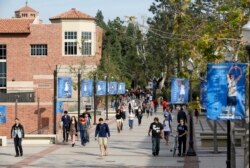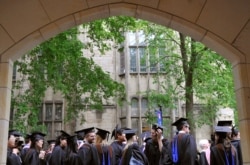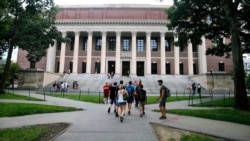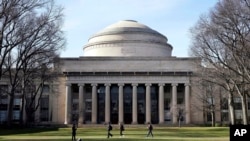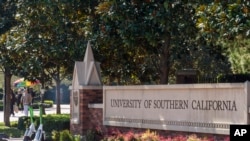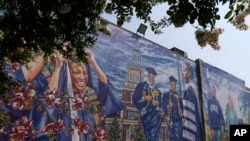Student Union
Study: Asian Americans Don’t Suffer From Admissions Rejection
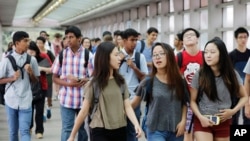
A new study concludes that Asian American students do not face negative consequences in college when rejected from their first-choice colleges and universities.
The study — published in Educational Researcher, a peer-reviewed journal of the American Educational Research Association — was conducted in response to claims by two groups representing Asian American students that say admissions rejection leads some of their members to suffer diminished interest and participation at school.
"It is what students do in college, rather than the level of institutional prestige alone, that most determines educational outcomes," said study coauthor Mike Hoa Nguyen, an assistant professor of higher education at the University of Denver.
The two groups, the Coalition of Asian American Associations (CAAA) and the Asian American Coalition for Education (AACE), say that U.S. colleges and universities, specifically prestigious schools like Harvard and Yale universities, discriminate against Asian American applicants.
The CAAA and AACE assert that those students spend less time on leadership, public service and co-curricular activities; are less satisfied with their academic institutions; hold a negative attitude toward academics and lower academic achievement; lack self-confidence and assertiveness; and have negative racial interactions.
In 2018, these assertions became part of a U.S. Department of Justice probe of affirmative action admissions processes at Harvard and Yale.
'Small differences'
Seven researchers at the University of Denver and the University of California-Los Angeles (UCLA) looked at student outcomes of Asian American college students based on their admissions and enrollment decisions.
Researchers analyzed data from two national surveys of 1,023 students who identified as Asian American: the 2012 Freshman Survey and 2016 College Senior Survey, both administered by the Higher Education Research Institute at UCLA.
The researchers assessed 27 student outcome measures spread across six general categories: academic performance and perception of academic abilities; satisfaction with college; self-confidence and self-esteem; level of student involvement; willingness and ability to contribute to society; and diversity of racial interactions.
"We found that only small differences, if any, exist between the self-reported outcomes of Asian American students who were admitted to and attending their first-choice university and those students who were not," said Nguyen.
Legal opinions
The U.S. Justice Department on August 13 said Yale University “illegally discriminated against Asian American and white applicants in its undergraduate admissions process."
“The findings are the result of a two-year investigation in response to a complaint by Asian American groups concerning Yale’s conduct,” the department announced.
Its investigation into Harvard University continues.
In October 2019, a federal judge ruled that Harvard had not discriminated against Asian and Asian American applicants.
"Overall, our findings countered the claims made by the two groups that served as the impetus of the Justice Department's investigation," Nguyen said.
Nguyen's coauthors include Connie Y. Chang, Victoria Kim, Rose Ann E. Gutierrez, Annie Le and Robert T. Teranishi at UCLA, and University of Denver scholar Denis Dumas.
"It is important to note that college choice and admission outcomes are not the only factor contributing to students' college satisfaction," Nguyen said. "Prior research indicates that feeling welcome and valued, instructional effectiveness, racial identity, and faculty and student interactions all impact college satisfaction."
In the "willingness and ability to contribute to society" and the "self-confidence and self-esteem" categories, across seven indicators, the groups showed no differences, according to the study research.
See all News Updates of the Day
Malaysian official: Schools can’t turn away from global tensions

Zambry Abdul Kadir, Malaysia’s higher education minister, said protests spreading across universities in the United States show that schools can’t ignore political tensions.
Helen Packer, reporting in Times Higher Education, said the minister reminded educators that universities are key in the development of leaders, individuals and societies. (April 2024)
Social media breaks are difficult, but necessary

Between online classes, maintaining social connections and working on projects, college students can have a hard time disengaging from the demands of technology.
In Florida International University’s PantherNOW, Ariana Rodriguez offers strategies for taking a break from social media. (April 2024)
- By Melos Ambaye
Many master's degrees aren't worth the investment, research shows
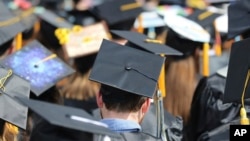
Nearly half of master's degrees have a negative financial return, according to new research by the Foundation for Research on Equal Opportunity, an economic research organization.
The study indicates that many graduate degree programs do not increase lifetime earnings enough to be worth it.
While 23% of bachelor’s degree programs yield a negative financial return on investment, 43% of two-year degrees and master’s degrees fail to deliver a return, according to the study by Preston Cooper, a senior fellow at FREOPP.
Cooper assessed the return on investment for 53,000 degree and certificate programs to determine whether a student’s lifetime earnings outweigh program costs and the risk of not completing their degree.
His findings show that a student’s field of study was the overriding indicator of return on investment at the undergraduate and graduate level.
Engineering, computer science and nursing bachelor’s degrees have high financial returns on investment, while programs in education, fine arts, psychology and English usually have low returns.
Graduate degrees in medicine and law tend to have strong payoffs. But a large share of master’s programs, including the MBA, frequently have low payoffs, according to Cooper.
Although workers with master’s degrees earn 16% more than those with only bachelor’s degrees, Cooper says the figure fails to account for students who had “higher preexisting earnings potential.”
“MBA students typically have high preexisting earnings potential, having often chosen high-ROI undergraduate majors such as finance and economics,” Cooper writes. “So the MBA adds little value on top of that.”
The study indicates that high starting salaries are predictors of high returns on investment. Degrees with starting salaries of $57,000 a year or more deliver the best lifetime returns.
But the return on investment of a degree can vary depending on the educational institution.
“Students interested in fields with low average pay can still find some schools that do well transforming those fields of study into high-paying careers,” Cooper writes.
The quality of an institution also matters, said William Tierney, professor emeritus of higher education at the University of Southern California.
“An MBA from Harvard is a likely ticket to a good job,” Tierney told VOA. “An MBA from the University of Phoenix, less so.”
But students pursue graduate programs for more than just financial reasons.
“Some degrees open up careers in fields that students may enjoy, such as in the performing arts,” Robert Kelchen, head of educational leadership at the University of Tennessee, Knoxville, told VOA.
“Others can help gain access to social networks or simply help students learn about a topic that is of interest,” Kelchen added.
Cooper told VOA that it might make sense for students in degree programs with low returns on investment to switch majors if they can still graduate on time.
He found the worst outcome for a student’s return on investment is dropping out of college “because they must pay for one or more years’ tuition and spend time out of the labor force.”
Lawmakers who fund higher education have a responsibility in ensuring “higher education delivers on its promise of economic mobility,” Cooper said.
Nearly a third of federal funding, including Pell grants and student loans, pays for higher education programs that fail to provide students with a return on investment, according to the study.
Cooper’s view is that “some schools should shut down low-ROI programs and reallocate institutional resources to programs with a better return.”
“There's definitely this narrative out there that higher education is always worth it, and you should always try to get that extra degree because it will increase your earnings,” he told VOA. “That's reinforced by colleges who make lofty promises regarding their graduate degree programs' outcomes, which all too often fall short.”
Harvard students end protest as school agrees to discuss Gaza conflict
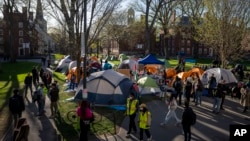
Protesters against the war between Israel and Hamas were voluntarily taking down their tents in Harvard Yard on Tuesday after university officials agreed to discuss their questions about the endowment, bringing a peaceful end to the kinds of demonstrations that were broken up by police on other campuses.
The student protest group Harvard Out of Occupied Palestine said in a statement that the encampment "outlasted its utility with respect to our demands." Meanwhile, Harvard University interim President Alan Garber agreed to pursue a meeting between protesters and university officials regarding the students' questions.
Students at many college campuses this spring set up similar encampments, calling for their schools to cut ties with Israel and businesses that support it.
The Israel-Hamas war began when Hamas and other militants stormed into southern Israel on October 7, killing some 1,200 people and taking 250 hostages. Palestinian militants still hold about 100 captives, and Israel's military has killed more than 35,000 people in Gaza, according to Gaza's Health Ministry, which doesn't distinguish between civilians and combatants.
Harvard said its president and the dean of the Faculty of Arts and Sciences, Hopi Hoekstra, will meet with the protesters to discuss the conflict in the Middle East.
The protesters said they worked out an agreement to meet with university officials, including the Harvard Management Company, which oversees the world's largest academic endowment, valued at about $50 billion.
The protesters' statement said the students will set an agenda that includes discussions on disclosure, divestment, reinvestment and the creation of a Center for Palestine Studies. The students also said that Harvard has offered to retract suspensions of more than 20 students and student workers and back down on disciplinary measures faced by 60 more.
"Since its establishment three weeks ago, the encampment has both broadened and deepened Palestine solidarity organizing on campus," a spokesperson for the protesters said. "It has moved the needle on disclosure and divestment at Harvard."
Chinese students report interrogations, deportations at US airports
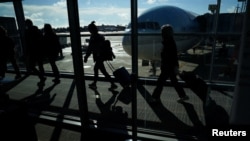
Academics from China are reporting increased scrutiny at U.S. airports, with valid visa holders being interrogated and turned away by Customs and Border Protection Agents.
Phones and laptops have been searched, and researchers have undergone extensive questioning about their work. One graduate student at Yale, who was midway through her PhD, was turned back at Dulles airport and banned from entering the U.S. for five years, according to The Guardian.




